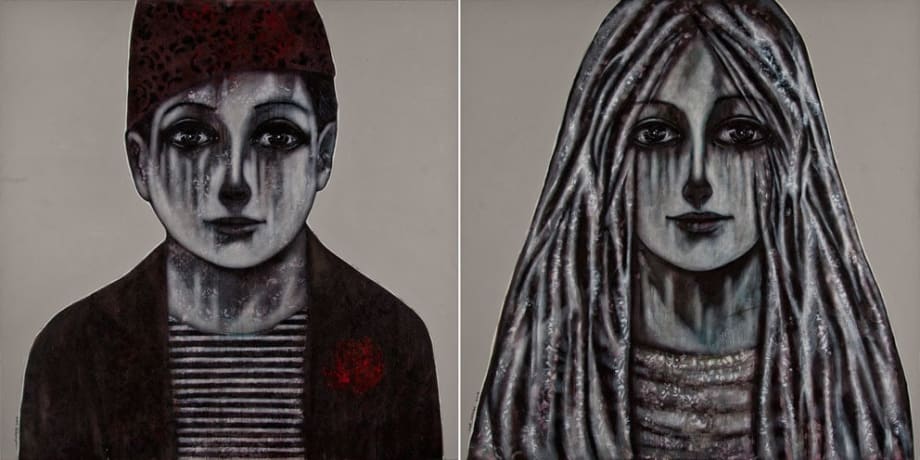Ayyam Gallery Dubai (DIFC) is pleased to present Family Portrait, the solo exhibition of Syrian artist Mohannad Orabi. In his latest body of work, Orabi explores the psychology of memory, and how this mental process shapes one’s perception of formative experiences. Addressing the subject of social relations and how children negotiate a sense of self while developing an understanding of the world around them, Orabi builds on the previous themes of his work. At the same time, the artist’s recent paintings revisit the semiotics of images: how pictures are constructed with forms and concepts, resulting in a system of signs. Orabi has investigated the signified meaning of popular imagery since 2012.
Shortly after relocating from Damascus to Cairo due to the intensification of the Syrian conflict, Orabi shifted the focus of his paintings from portraits describing familial bonds to compositions examining the everyday media that are now integral to social interaction. Displaced from Syria and separated from his family and friends, Orabi began to read the experiences of his compatriots through their social media presence and noticed that an informal archive of images registering the human side of the conflict had formed. Family Portrait invokes the black and white format of old photographs with a limited palette and the figuration of formal portraiture.
In several works, Orabi references studio photography as families sit with formal poses or individuals are closely framed. The horizontal composition of a 2015 painting, for example, shows a mother and her four children huddled yet poised. A thin white border outlines the contours of their bodies with a continuous line as they are rendered against a grey background, describing the collective nature of the family unit. This descriptive formal detail also gives the appearance of a cutout, as though the image has been salvaged from an original photo—an aspect that invites the viewer to form personal associations, as the experience of forging identities and individual histories through the material of visual culture is universal.
Other paintings of the series recall the minimal portraiture of passport pictures with figures that are shown in partial profile, directed towards a focal point outside the image, or sitters who stare directly at the viewer. This subtheme of the exhibition brings to mind the accumulating narratives of those who are now faced with the obstacles of forced migration, a reflective thread that mirrors the Dubai-based artist’s own experiences. A portrait of a small boy dressed in a button down shirt and a checkered jacket describes a child’s state of anxiety. The boy slouches as though an invisible weight presses on his fragile body. Although painted with Orabi’s stylised approach to figuration, the boy’s face is rendered with painstaking detail. Pensive yet attempting to be brave, thoughts of travel and an uncertain future bring the child to tears.
About the Artist
Dominated by vivacious childlike figures in various scenarios, Mohannad Orabi’s previous paintings reflect his interest in the spontaneity of process and the liberation of form that emerges when art is created intuitively without fixed directives. Many of these mixed-media canvases were painted as self-portraits, revealing the artist’s fascination with the evolution of consciousness in childhood and the wonder and whimsy of the formative years that first shape our comprehension of the world.
With the start of the Syrian uprising and the conflict that followed, Orabi adopted an increasingly realist approach to portraiture, drawing inspiration from the various media that are currently forging a visual repository of the war. Martyr posters, Facebook profile pictures, and other types of filtered or composed imagery serve as source material for portraits of Syrians under siege, displaced, and in exile, recording a side of the conflict that lies beyond its ideological divisions and political talking points. While the artist retains an interest in the socialisation processes of childhood, his own experiences of now living outside the country have led him to consider the ways in which visual culture, social media, and digital communication have become substitutes for what was once tangible.
Born in Damascus in 1977, Mohannad Orabi currently lives and works in Dubai. Orabi graduated from the Faculty of Fine Art in Damascus in 2000 and won the first prize in The Syrian National Young Artists Exhibition in 2006. Solo and group exhibitions include Ayyam Gallery London (2014); Ayyam Gallery Jeddah (2013); Ayyam Gallery DIFC, Dubai (2014, 2012); Ayyam Gallery Al Quoz, Dubai (2014, 2009); Ayyam Gallery Beirut (2014); Ayyam Gallery Damascus (2008), Zara Gallery, Amman (2007); and Ishtar Gallery, Damascus (2006, 2004). Orabi was listed among Foreign Policy’s '100 Leading Global Thinkers' in 2014.
